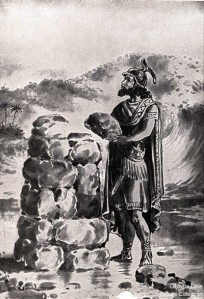
This is my final post that pays tribute to Dave Dorsey, in light of his recent passing. (To read the others, please use the search field in the sidebar and search “Dorsey”.)
One of the lasting legacies of David Dorsey is in archeology.
After much research and motorbiking around the area. Dorsey correctly located the biblical place Makkedah–the location of the cave where five Canaanite kings hid from Joshua (Josh 10:16).
In class he gave us the details of this adventure which included a lot of language research (forensics, really), visiting the area and speaking with local inhabitants, and even included a strange tale of a strange (and he said perverse) Arab man who offered him his wife and daughter for sexual pleasure.
(I’ve heard of Middle Eastern hospitality…but that’s just too hospitable, right?)
Dorsey’s proposal was not accepted immediately– theories are typically contested–but the location is well-accepted now in reference books and textbooks. It’s commonly seen printed on Biblical maps that refer to that time period. If you hear the story, think about Dave and this contribution. It’s a fine legacy.
You can read his paper on the location here.
You can read of this and other findings in this book.
I hope you’ve enjoyed this brief foray into the influence Dave Dorsey had on me. I could continue this series for a long time, and perhaps, once in a while, I will post a gem of knowledge or wisdom he gave me.


 I really enjoy reading
I really enjoy reading 
